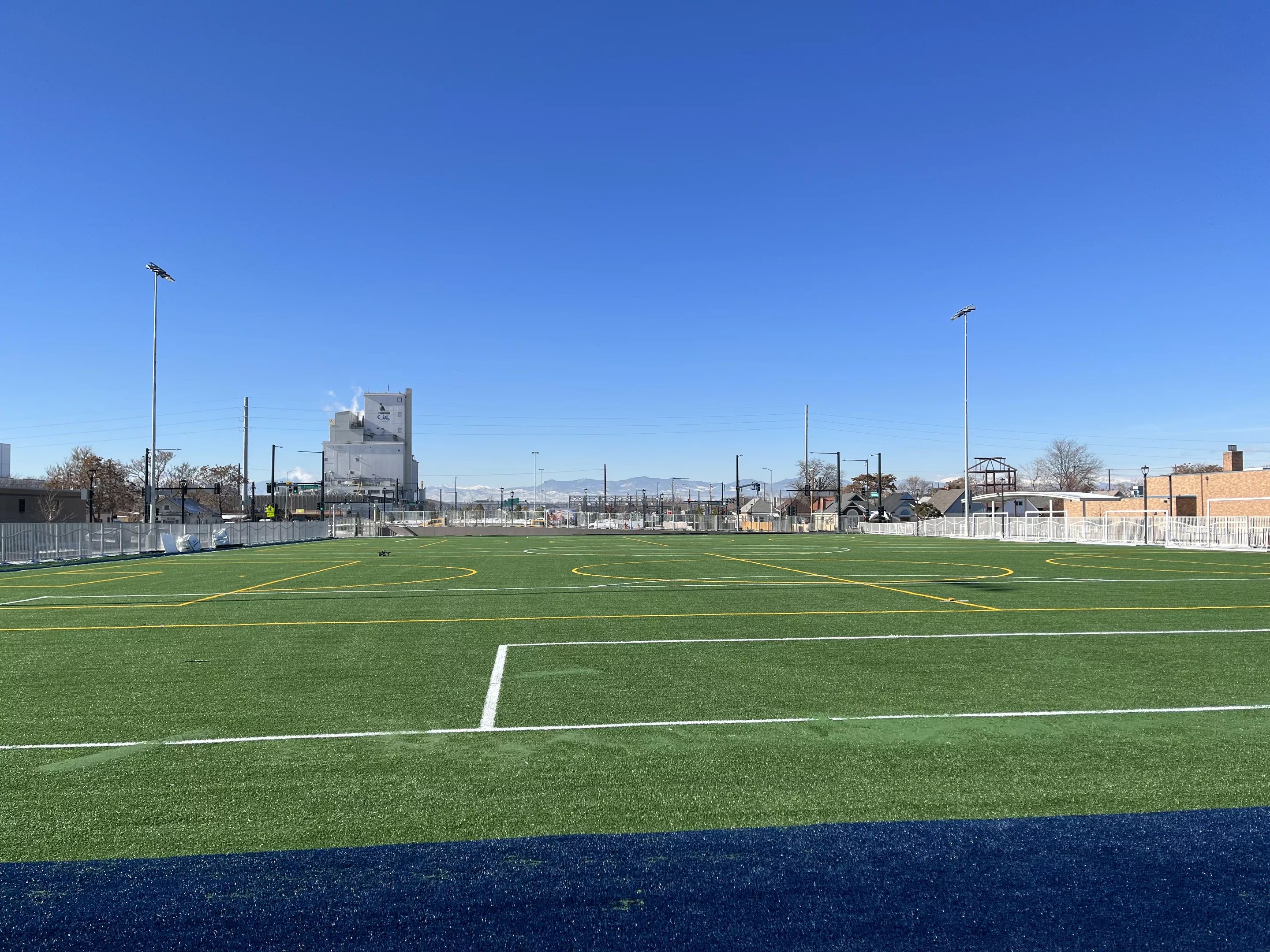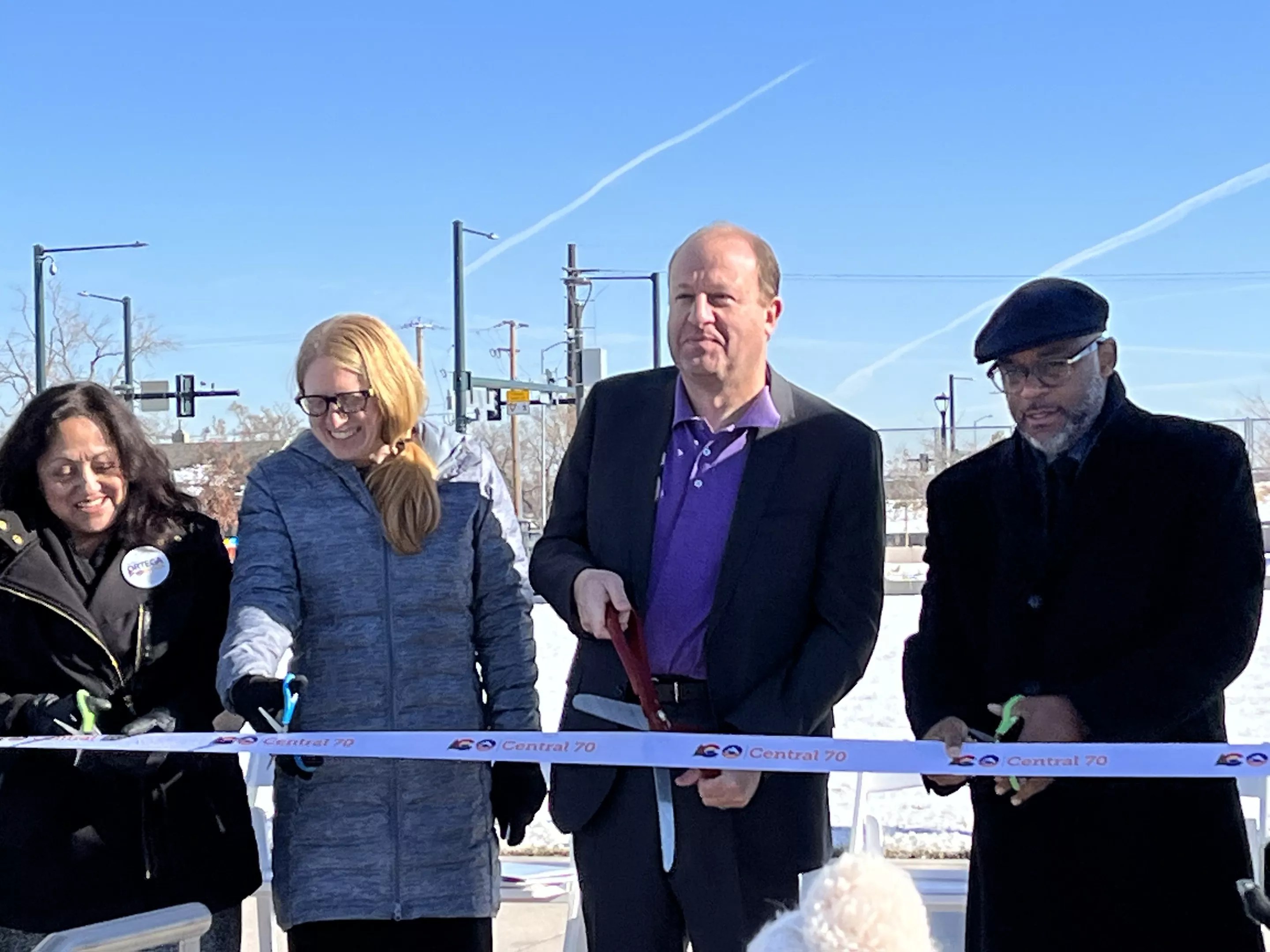
Conor McCormick-Cavanagh

Audio By Carbonatix
When local, state and federal officials gathered on top of the $1.2 billion Central 70, the rebuilt, expanded stretch of Interstate 70 that cuts through Denver, they seemed to expect a walk in the park. The tone at the November 29 event was celebratory as Governor Jared Polis and Mayor Michael Hancock cut the ribbon to officially open the $60 million park that tops the highway.
“This is a proud moment for Denver for a lot of reasons. This will become a gem, and this is the result of community engagement and community visioning,” Hancock said.
Although officials acknowledged the devastating effect of I-70’s initial construction on the Globeville and Elyria-Swansea neighborhoods, those who spoke during the ribbon-cutting suggested that the addition of the park atoned for much of the past.
“We can’t turn back time and change the fact that a highway was built through the middle of this neighborhood, an emblem of how infrastructure was built in the 1950s and 1960s,” said Stephanie Pollack, acting administrator of the Federal Highway Administration. “But we can be very clear moving forward. The purpose of transportation must always be to connect and not separate. And faced between the choice of wallowing in the mistakes of the past and making new choices in the present for the future, we must choose to build our infrastructure with the intention and impact of connecting our communities.”
The four-acre park has a turf soccer field (the adjacent Swansea Elementary will get exclusive access to it during school hours), a playground for kids, an amphitheater and mountain views. Denver Parks and Recreation and the Denver Botanic Gardens will handle programming for the area. And the park, which is now open, does offer a connection between neighborhoods that were formerly separated by the highway.
But to Alfonso Espino, a community organizer with the Globeville Elyria-Swansea Coalition, a group founded in 2015 to combat residential displacement, it feels like the project was a “cover-up” and not a “cover park.”
As for officials’ suggestion that the idea for the park came from community members, “That’s total bullshit,” Espino said at the ribbon-cutting.

Governor Jared Polis and Mayor Michael Hancock cut a ribbon to inaugurate the park.
Conor McCormick-Cavanagh
“It’s very interesting how they’re really just whitewashing that history. Kind of patting themselves on the back, saying they told us to do this and we’re completing what they asked of us. People asked them not to take their homes. That’s what they were asked to do,” Espino added. The Colorado Department of Transportation purchased, then demolished 56 homes as part of the Central 70 project.
But it’s not possible to completely cover up the history of this part of Denver.
The smelting industry was once headquartered here, and the Globeville, Elyria and Swansea neighborhoods were home to those who worked in the smelters, many of them immigrants from Eastern Europe.
In the late 1940s, city officials and state highway planners began considering creating an east-west route that would cut through the area, which had some of the worst traffic in Denver and was heavily polluted from smelting and other industries. By 1948, the road that would become Interstate 25 was already cutting through the western portion of Globeville, and having a road head east from there made sense to boosters.
In the late 1950s, Federal Highway Administration planners suggested putting a new interstate through this northern section of Denver, and local and state officials agreed. Despite protests from some residents, who particularly opposed the idea of an elevated highway, plans moved forward, leading to the obliteration of blocks of small houses and shops. The I-70 viaduct that reached from Colorado Boulevard to I-25 opened in 1964.
Four decades later, as CDOT began planning for an expansion of I-70 through that area, residents of Globeville and Elyria-Swansea and other planners called for moving the interstate out of the neighborhoods, possibly to the north. In 2017, though, CDOT finalized a plan to expand that section of the highway along the original footprint. The department said that it wasn’t feasible to move the highway to another part of the metro area, but agreed to put a significant section underground and cap the tunneled stretch with a park.
The $1.2 billion project involved CDOT removing much of the crumbling viaduct and lowering I-70 between Brighton and Colorado boulevards while expanding the highway as it runs through Denver. The construction of the park was the final major element in the Central 70 project.
“I’m sure some people are really happy in the neighborhood to see another park, for sure,” Espino acknowledged, then added, “I hardly see any people here from the community.”
Like the Federal Highway Administration, CDOT has acknowledged major missteps of the past, especially instances where highways were built through communities that were poor and predominantly minority. And according to Shoshana Lew, executive director of CDOT, the department has continued to learn from those mistakes.
“CDOT today is not the CDOT that started this project, and the feedback early on and the advocacy of community members leave behind lasting legacies and improvements for our department,” she said at the ceremony.
For example, the Central 70 project hired a certain percentage of the workforce from the local community, an idea that CDOT has started using for other projects.
But Espino would like to see a lot more from CDOT.
“I just hope that this isn’t what they think is the last thing they’ve got to deliver,” Espino said, pointing to several parcels adjacent to the park that CDOT owns. Espino said he wanted CDOT to give those parcels to the community so that housing can be built on them, and “that’s what the coalition is going to be organizing for,” he said.